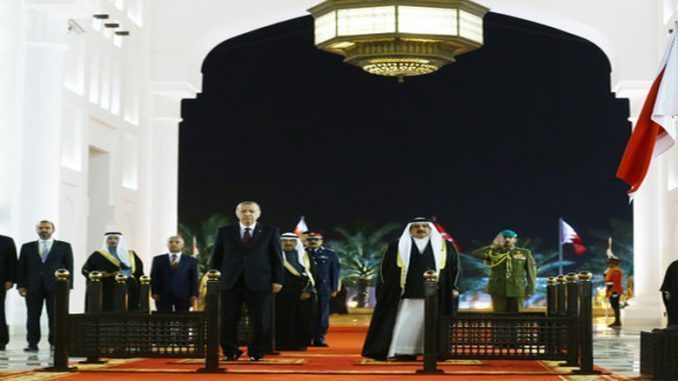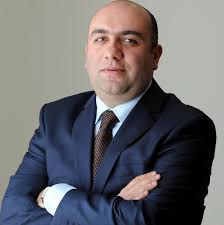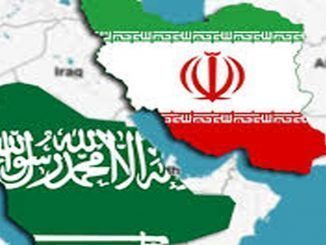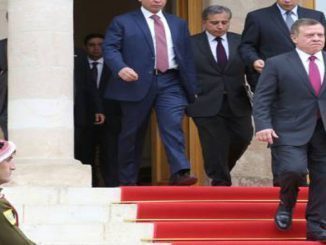
 BY: ÇETİNER ÇETİN*
BY: ÇETİNER ÇETİN*
Turkish President Recep Tayyip Erdoğan’s visit to Saudi Arabia has been his third visit in King Salman’s era. The visit coincides with a period when common points of interest of the two countries are converging. Saudi Arabia-Turkey relations are also following an increasingly developing trend. In fact, eight meetings were held at the highest levels between Turkey and Saudi Arabia in the last two years. Turkish and Saudi leaders came together in five of these meetings. The two of them were held between the Saudi crown prince and Erdoğan. On one occasion, the Saudi deputy crown prince and Erdoğan met.
These meetings show the reconciliation and the coordination between the views of the two countries. The Turkey-Saudi Arabia Coordination Council which was established last year brought a new dimension to the cooperation between the two countries. As a matter of fact, nearly 50 different institutions from both countries participated in the first council meeting held in Ankara recently. In addition to cooperation between Saudi Arabia and Turkey, parallelism in their perspectives are also evident in many areas in the region, especially in Syria, Palestine and Libya, as well as in the fight against terrorism. They also formed cooperation in the military area. Four joint military exercises were held last year. Saudi jets started using the Incirlik Military Air Base as part of the fight against terrorism and especially Daesh, while Turkey joined the Islamic Military Alliance (IMA).
Erdoğan’s visit to Saudi Arabia, Bahrain and Qatar led to a division in Gulf states. Especially the United Arab Emirates (UAE) which remained outside of visits is astonished. However, Ankara has quite a right justification for it. In fact, the UAE’s and the other two Gulf countries’ – Oman and Kuwait – indifference toward the resolution of the problems of the Islamic world aroused Ankara’s reaction. Especially the political position of the UAE, where an anti-Turkey rhetoric was developed, was not welcomed in Ankara. There is a common ground between Oman, the UAE and Kuwait. When viewed from the outside, it is a position where they keep their nose clean, but actually serve Iran’s Middle East policies. At least it looks like this when viewed from Turkey.
Erdoğan is managing internal and external conflicts with a strong and growing consciousness, thinking that Turkey is a regional superpower. For the first time, Russia and the U.S. have succeeded in having a strong network with Iran, Qatar, and Saudi Arabia at the same time – which was a diplomatic privilege. With new U.S. President Donald Trump’s administration, regional balances are changing. Ankara and Washington’s negotiations on the new equitation are accelerating. Hence, Erdoğan has begun closely monitoring the UAE, Kuwait and Oman in the background as they have long avoided meddling in regional issues.
Coordination against common threats
Developments in the region led not only Saudi Arabia but other Gulf countries to strengthen their relations with Turkey. Threats in the region are common and there is a need for coordination to overcome them. Turkey’s relations with Gulf countries in recent years are stronger than in previous years, and there is a similarity in their points of view. In fact, Iran’s aggressively growing influence in the region can become a threat not only against Gulf states but also the interests of Turkey. Iran supports the Kurdish Democratic Union Party (PYD) and its transition to the west of the Euphrates in order to create a threat to Turkey. So, it wants to have full control of the region by making Turkey be busy with the borders. From this point of view, there are common political, military, economic and
security-related interests between Turkey and Gulf states. Saudi Arabia’s a-solidarity with Turkey after the failed coup attempt of July 15, which targeted Turkey’s stability, security and integrity, has also increased the rapprochement between the two countries.
There is unprecedented mobility in Turkey and Gulf Cooperation Council (GCC) countries in recent days. In addition to mutual high-level visits, a strategic cooperation forum with Saudi Arabia and an economy forum with the UEA were held. Moreover, Erdoğan’s visits to Bahrain, Saudi Arabia and Qatar started on Feb. 12.
Within this framework, there are many reasons that push Turkey and Gulf countries to converge and strengthen relations in all areas. These reasons are mainly political and economic and concern countering common challenges in various areas. This rapprochement has become crucial than ever. The growing cooperation between Turkey and GCC countries has not yet reached the level of strategic alliance and has not yet succeeded in restricting big targets on Syria and Iraq and Iran’s influence. However, there are many positive elements for both parties. Even if it is not possible to achieve big gains, it seems possible to reduce losses.
Iran’s regional policies
Although Turkey is not an enemy to Iran and has comprehensive economic and good political relations with it, Ankara considers Iran to be a regional rival. Ankara opposes Iran’s policies in Syria, Iraq and Arab countries in general, and focuses on criticizing and stopping its sectarian policies in the region. This attitude of Turkey is considered to be very close to the attitude of GCC countries toward Iran. This is regarded as an obligatory reason for GCC countries to establish solid relations with Turkey.
Erdoğan has a personally firm stance on the Shiite expansionism in the region. This attitude has manifested itself in many issues. In fact, Erdoğan clearly sided with Saudi Arabia in the crisis it had experienced with Iran regarding the management of the Hajj season, and gave a remarkable support to Riyadh in this regard. In addition, he clearly supported the Gulf alliance against the Iran-backed Houthi rebels in Yemen. Earlier, Turkey declared respect for the demands of the UAE for the islands occupied by Iran and condemned the attacks of Iran-backed groups in Bahrain.
Moreover, Turkey is greatly active in Africa as well as Saudi Arabia. This situation contributes to restricting Iran’s efforts to spread its influence in Africa.
On the other hand, the U.S.’s argument that Iran is a country supporting terror is no secret to anyone. As a NATO member, Turkey shares both its own security and the U.S.’s security with the U.S. Saudi Arabia is disturbed by Iran’s influence in the region and its interventions in the internal affairs of GCC member countries. This latest response of the U.S. to Iran is intended to test the waters in other countries’ attitude on Iran. So, although Ankara does not expect a military move from the U.S. on Iran, it predicts that the U.S. can give up the nuclear deal at the most. If this happens, it might stalemate EU studies and seize its assets in the U.S. by using the embargo leverage.
Syria and regional policies
With regional changes and the aggravation of challenges, Gulf countries had to go into many conflicts in the region in order to protect their security and regional interests and to stop the influence of rival forces in the region (especially Iran). While Saudi Arabia and many Gulf states deployed their forces to Yemen to fight against Iran’s allies, they could not directly incorporate their forces into the Syrian civil war and formed alliances with Turkey to become a party in the Syrian issue. This came after the interests of the parties coincided in the context of overthrowing Bashar Assad and fighting Shiite
militias. Although Turkey cannot directly do this (fight Shiite militias), it has been able to provide logistical and indirect military support with the support of Gulf states – which has prevented the war from taking longer and ending in favor of Assad and his allies.
Although Turkey’s Operation Euphrates Shield in northern Syria was initially launched to protect Turkey’s interests, it has come to include Raqqa thanks to possible agreements with Trump and Saudi Arabia’s support. This will reduce losses in Syria and help protect the Sunni control in other regions.
Sunni constituents in Iraq
Turkey and Gulf countries are very sensitive that the demographic structure in Iraq should be protected. They are in alliance and are calling for stopping the relocation operations and population change based on sectarian principles. These relocation operations have already shown themselves in the beginning of the operations of expelling Daesh from Mosul.
Although Turkey, which is closely interested in the subject and has made great efforts to take part in the operation to liberate Mosul, could not directly achieve what it wanted, Turkish forces are still present in the city. In addition, after the liberation of Mosul, Turkey has guaranteed that Turkish army would be led by the Sunni forces trained by Turkey. In general, Turkey has emerged as an entry point for Gulf states to continue to have a say in northern Iraq. This came after Ankara formed close relations with the Kurdistan Regional Government (KRG) and Sunni constituents in northern Iraq.
Economic cooperation
Economic interests between Turkey and Gulf states have coincided in an unprecedented way recently. In the meantime, Turkey, which is suffering from the economic crisis and a hard fall in the local currency, is also trying to attract investors from the Gulf region. On the other hand, Turkish companies especially in the construction sector have become preferable in many Gulf countries. In addition, Turkey continues to export clothing and food products and other preferred consumer goods to Gulf countries.
While Trump has not made his policy on Gulf countries clear, Ankara wants to attract some Gulf investments in the U.S. to itself.
Increasing terrorist threats and transformations in the region increase the need for both parties to seek new allies and build different alliances from the past. This is also because of the feeling that former President Barack Obama’s policies left both parties in the lurch, as well as of Trump’s still unclear policies.
*Çetiner Çetin is a Turkish journalist. He wrote this article exclusively for the Middle East Observer on Wednesday, Feb. 17, 2017.



